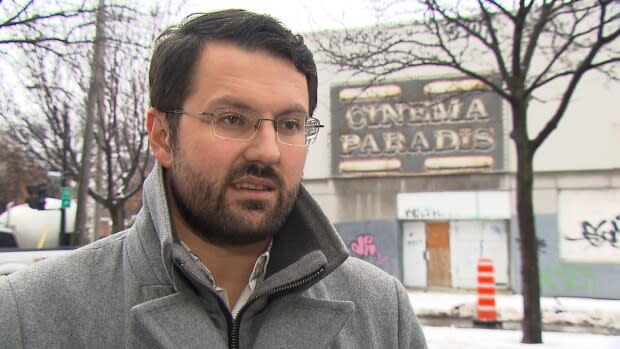Guzzo's derelict Cinéma Paradis has got to go, says east-end borough mayor
The Cinéma Paradis in Montreal's east end has been boarded up for a decade, collecting a mix of spray paint and urban grime while the borough strives to revitalize the area.
Mercier–Hochelaga-Maisonneuve borough Mayor Pierre Lessard-Blais says the CEO of Cinémas Guzzo, Vincenzo Guzzo, can no longer ignore the theatre his father bought in 1974, which launched the family empire.
What will be proposed for the derelict building and when is still anybody's guess, but there are plenty of ideas floating around the community.
The local merchants' association wants more commercial space for Hochelaga Street as the strip becomes increasingly vibrant, while a tenants' advocacy group says the old building should be replaced by much-needed social housing.
As for the mayor, he envisions a residential complex with commercial space on the ground floor, but no matter what, he said the first step is for Guzzo to submit a plan.
"We are very open to having proposals from him," said the mayor. "The citizens are tired. They just want a good project here. And I think it could be something good for the neighbourhood."
Just this year, eight new businesses have opened on the street, according to Lessard-Blais, who attributes that economic resurgence to borough initiatives.
While the area shows signs of returning to its former glory, he said the building is "pulling the neighbourhood down."
No matter what, it's up to the building owner — not the borough — to come up with a plan, he said.

Blame game heats up
Borough staff met with the theatre giant over the summer to push for a proposal, and this week, the mayor took to social media, issuing a call on Facebook for Guzzo to submit it.
Guzzo returned fire, saying he has been trying to do something about the building for years, but the city keeps getting in the way with its strict zoning regulations and arduous permit approval process.
On top of that, the city's demands and taxes are costly, Guzzo said.
Every two or three years, the theatre giant is asked to hire a structural engineer to do a safety inspection, and those inspections cost thousands of dollars, he said. The company also pays some $25,000 in property taxes annually.
The theatre was built in 1965. Angelo Guzzo bought it nine years later, taking his first step into the movie operator business — a business went on to become the third-largest in Canada.
The cinema shut down in 2009, and Vincenzo Guzzo said his company has done what it can to keep it from being defaced but the city is failing to protect his property from vandalism.
Guzzo said he's proposed two projects for the site. The first was aborted, and he said the second fell flat when Montreal Mayor Valérie Plante's administration took office.
According to borough records, there was a zoning derogation request submitted in 2010 when the cinema company wanted to build an office building.
The mayor said that the project was approved and then abandoned by the developer. There has been no formal proposal since, borough records show.

Potential for development is there
Regardless, Guzzo said, he sees potential in a residential complex with ground-floor commercial space, but municipal regulations and decision-makers often thwart progress.
He accused the Plante administration of "being against businessmen."
He said the borough should instead be the one making the proposal, and he'll approve it if it proves economically viable. That's the only way he'll get a project off the ground, he said.
"This guy, his move is a Donald Trump political move," Guzzo said, expressing frustration with the borough mayor's Facebook post this week.
"He went out on social media while his bureaucrats are trying to get a deal done and trying to figure out what's best for that corner. He's there sabotaging the deal."
What does revitalization look like?

Viviane Caron, executive director of the Association des commerçants de Tétreaultville, said the Cinéma Paradis is a building her organization speaks about often.
"It's a building that could help the revitalization of the economy," she said. "A property like this could be very interesting for redevelopment."
Regardless of the property's investment potential, there is an ever-increasing lack of affordable housing in the area, and that's something the city should keep in mind, said Lili Bergeron, a community organizer with the social housing group Infologis.
In 2016, Infologis hung a banner on the abandoned cinema to highlight the need for more housing.

With some 300 people on a social housing waiting list in Montreal's east end, Bergeron said, it's frustrating to see an abandoned building taking up scarce space, when so many are in search of a place to call home.
"We are in a housing crisis right now," she said, and if the building is turned into high-end apartments or condos, only a small percentage is invested in social housing under municipal regulations.
"The ideal situation is the city buys the property and turns it into 100 per cent social housing."


